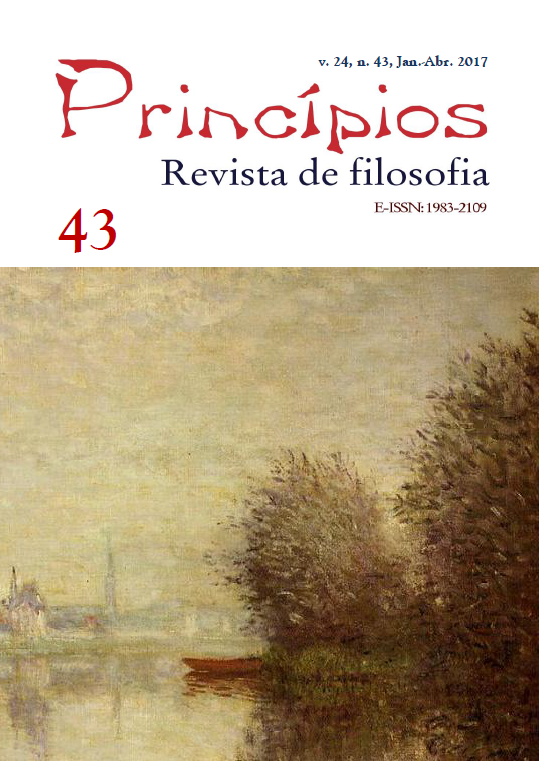Diderot e os Salões: a crítica a Watteau [Diderot and the Salons: critique towards Watteau]
DOI:
https://doi.org/10.21680/1983-2109.2017v24n43ID11145Palavras-chave:
Diderot, Salões, Watteau, Século XVIII [Diderot, Salons, 18th Century]Resumo
Com base no Salão de 1765, buscaremos mostrar qual é o fundamento da crítica de Denis Diderot à obra pictórica de Antoine Watteau, além de indicar as características essenciais de uma pintura do ponto de vista diderotiano. Mostraremos como seu projeto filosófico procura retomar na pintura setecentista alguns elementos clássicos. Para compreender plenamente o contexto em que esse projeto é elaborado, parece estratégico fazer algumas considerações a respeito da vida de corte na passagem do século XVII para o XVIII. Nossa intenção, assim, é a de mostrar como e por quais razões Watteau, mesmo sendo considerado um bom colorista, é criticado por Diderot.
[We will try to show what is the foundation of Denis Diderot’s critique on the compositions by Antoine Watteau. Besides, we will explicit which are the main qualities of a painting for the philosopher. We will show that Diderot wants to see some classical features in the paintings of his Century. In order to understand the context of this project, it is strategical to make some considerations about the court life at the end of the 17th Century and beginning of the 18th Century. Our goal, then, is to show how and why Diderot criticizes Watteau, even the last one being considered a good painter]
Downloads
Referências
BAYNHAN E.J. Power, passion and patrons: Alexander, Charles Le Brun and Oliver Stone. In: HECKEL, Waldemar; TIRTLE, Lawrence A. (Org.). Alexander the Great: a New History. West Sussex: Wiley; Blackwell, 2009.
COTTÉ, Sabine. Watteau. Paris: H. Scrépel, 1984.
DIDEROT, Denis. Obras II. Org. J. Guinsburg. São Paulo: Perspectiva, 2000.
DIDEROT, Denis; D’ALEMBERT, Jean le Rond. Enciclopédia. Vol. 5: Sociedade e artes. Trad. Maria das Graças de Souza [et al.]. São Paulo: Unesp, 2015.
DUBOS, Refléxions critiques sur la poésie et la peinture. Vol. 2. Paris: Marinette, 1740.
EHRARD, Jean. L’idée de nature en France à l’aube des Lumiéres. Paris: Flammarion, 1970.
ELIAS, Norbert. A sociedade de corte. Trad. Pedro Süssekind. Rio de Janeiro: Zahar, 2001.
FIGUEIREDO, Vinícius. Diderot e as mulheres: um debate do século XVIII. Discurso. São Paulo, v. 45, n. 1, 2015, p. 95-118.
GREUZE, Jean-Baptiste. Le fils puni. 1777. Paris: Museu do Louvre. Óleo sobre tela, 130 por 163 cm.
GREUZE, Jean-Baptiste. Le fils ingrat. 1777. Paris: Museu do Louvre. Óleo sobre tela, 130 por 162 cm.
HAUSER, Arnold. História social e literatura. Trad. Álvaro Cabral. São Paulo: M. Fontes, 2000.
LE BRUN, Charles. Les reines de Perse aux pieds d’Alexandre. 1660. Paris: Palácio de Versailles. Óleo sobre tela, 298 por 453 cm.
LEVEY, Michel. Du rococo à la révolution. Paris: Thames & Hudson, 1989.
TROUSSON, Raymond. Denis Diderot ou le vrai Prométhée. Paris: Tallandier, 2005.
WATTEAU, Antoine. Accordée de village. 1710-1715. Londres: Museu Sir John Soane. Óleo sobre tela, 63 por 92 cm.
WATTEAU, Antoine. Assemblée dans un parc. 1716-1717. Paris: Museu do Louvre. Óleo sobre tela, 32 por 46 cm.
WATTEAU, Antoine. Pèlerinage à l’île de Cythère. 1717. Paris: Museu do Louvre. Óleo sobre tela, 129 por 194 cm.
WATTEAU, Antoine. Les Champs-Élysées. 1717-1718. Londres: Wallace collection. Óleo sobre tela, 31 por 42 cm.
Downloads
Publicado
Como Citar
Edição
Seção
Licença
Autores mantêm os direitos autorais e concedem à revista o direito de primeira publicação, com o trabalho simultaneamente licenciado sob a Licença Creative Commons Attribution que permite o compartilhamento do trabalho com reconhecimento da autoria e publicação inicial nesta revista.
Termos da licença:
| Não Comercial (NC) | Os licenciados podem copiar, distribuir, exibir e executar a obra e fazer trabalhos derivados dela, desde que sejam para fins não comerciais. |
| Compartilha Igual (SA) | Os licenciados devem distribuir obras derivadas somente sob uma licença idêntica à que governa a obra original ou menos restritiva. |


 Português (Brasil)
Português (Brasil) English
English Español (España)
Español (España) Français (Canada)
Français (Canada)


